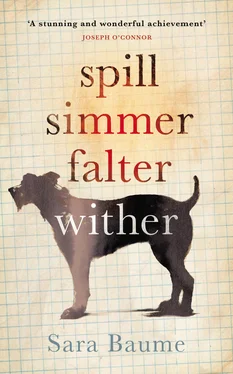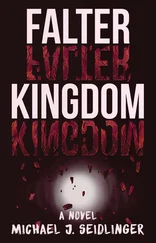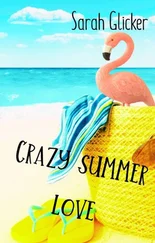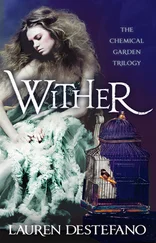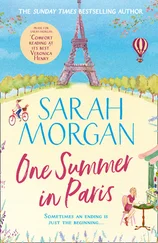Now you know the slightest of sights and sounds which indicate I’m preparing to eat. You know the curt compression of air which signals the opening of the fridge, the click of the cupboard’s magnet, the whirr of the springloaded drawer. You know the screech of spatula against the base of a margarine carton, and you know this means it’s ready for you to slather out. You know, when I eat an apple with a paring knife, the exact angle my hand takes when I pare a piece especially to toss to you.
A full stomach is a kind of sanctuary, I understand that. I’m a scoffer too. Even though I’m never hungry, I remember hunger and so sometimes I scoff desperately, mindlessly, as though I can eat now every proper meal I missed in childhood. It took me many years to face the shop assistants, to fathom my way into town alone, and until then I was dependent on my father who could barely cook and kept the cupboards only erratically stocked. Now when I feel the food heat oozing from my belly, bulging through my blood, it makes me feel better. Can you feel the heat, the ooze? I know the reason you check your bowl compulsively is because I’m always dropping titbits into it. A splash of milk here, a spaghetti hoop there. Wherever you happen to be in the house or yard, you hear it and bolt to the kitchen, crash into the cubby hole, your head already dropped to bowl-level. I have inadvertently trained you, but you have trained me too. Now I let you slather everything out, every mixing bowl and plate and lid. With the herculean strength of your tongue, skilfully you propel my crockery around and around the kitchen floor, until it gets stuck beneath a stool, wedged into the fractured kickboard.

Tonight, again I dream as you.
I dream I’m inside a pen with a water dish but no food bowl. I dream a man who comes once a day with a basin and trowel and he slaps scraps onto the ground with a noise like a colossal bird plop. The scraps come from all colours but blend together into brown and taste like yeast and grease and soured milk. I dream the seasons passing, real seasons, like when I was a boy. In sun times, the scraps arrive congealed. In rain times, they come puddled, diluted by drizzle to a grizzly grey gruel.
Tonight, I dream of the place where you came from, the place where you were starved.

I’m going to teach you to walk nicely, and we’re going to practice along the bird walk, to the very end and back again, every day.
The bird walk is a belt of concrete skirting the sea front from the main street of the village to the gates of the power station. Running alongside the concrete there’s a squat wall and a row of street lamps. There are flowerbeds and picnic benches and a couple of ornamental ponds. As we cross the road, you’re trotting steady with the planky soles of my shoes, keeping stride with the swoosh of my trouser legs. Here’s the signpost that says BIRD WALK and here’s the information board. See behind the cracked perspex, each wader’s portrait in peeling and discolored paint. But you’re distracted by the tumult of smells rushing from the banks of the path to meet you. You launch into the weed-beds, nose first.
The ponds are filmed by gunk too thick on the surface for skeeters and too stagnant underneath for frogspawn. What once were blooms are now mostly weeds, and even the weeds are smothered by the gloop of leaves still festering from last autumn. What are not weeds are the descendents of seeds sown by the resident’s committee, years and years ago. Even though nobody tends them any more, some still manage to flower in spring and summer. See here, these buds will become marigolds, I think. And these leaves belong to the sweet-william. I know the names of most trees and flowers, but I learned them very slowly. With no one to guide me, everything I know is learned slow and fraught with mistakes. Now I know the wildflowers only by finding them, one by one, and searching in my nature book for a name, and then finding them over again and naming them for myself, until I’ve got them all right, and remembered.
At high tide, the sea rises to lap against the bird walk’s wall and gulls bob at beak-level with the concrete. At low tide, the water falls back to expose a no man’s land of stinking mud. It’s at low tide that the wading birds come. Oystercatchers with their startled eyes, redshanks scurrying tetchily on strawberry legs, little egrets freshly laundered, whiter than white. The path ends in a copse of pines which hide the security fencing and boxy buildings of the power station, but the trees are far too short to hide the chimney and its flossy smoke. In winter, the wind shakes their cones into the sea, and I find them washed up on the beaches. On every beach all around the bay, I recognise these pinecones.
As I turn back, you’re still hustling amongst the greenery. I call but you don’t seem to hear, you’re hypnotised by smell. Now you zig-zag the concrete, hop onto the wall and shout at the gulls, bust into a frenzied run. Now you freeze beside a tuft of primroses and plug your claws into the ground and won’t budge for all the chocolate buttons in my trouser pocket. How can you be so unremittingly interested? How can every stone be worthy of tenderly sniffing, every clump of grass a source of fascination? How can this blade possibly smell new and different from that blade, and why is it that some require to be pissed upon, and others simply don’t? I wish I’d been born with your capacity for wonder. I wouldn’t mind living a shorter life if my short life could be as vivid as yours.
You aren’t exactly obedient. I want to believe your intentions are good, but I doubt they stand a chance against your maggot nose. I watch it working as we walk, drawing you into everything most vile, all the drippings and droppings left in the weeds by creatures gone before. The spraint of an otter, the spray of a tom, a bobbin of sweet shit which you try to wolf while I’m not looking. I haul you up, prise your jaws open, shake the shit out.
‘BOLD!’ I holler, ‘BOLD BOLD BOLD!’ But I know it’s wrong of me to scold what’s natural to you. I’m sorry, I shouldn’t holler.
Another walker’s coming toward us. A man in a fleece with a boxer, I think it is. Tanned fur and face ironed flat like a primate. The closer they come, the more you’re tugging, tugging, tugging. I stop and draw aside from the path and bind my wrist into the leash’s loop. Now you’re barking and thrusting with all your strength and wrath, and I’m holding on so hard the blood drains from my knuckles. The man nods as they pass but the boxer just stares as though you’re a lunatic, as though we are a pair of lunatics.
‘Bold!’ I whisper, ‘bold bold bold!’
I don’t understand why you aren’t throttled. I heave us on toward the information board. It takes until they’ve disappeared for you to calm down and walk forward again. Still for some distance, you glance behind. You whimper as though wounded, bereft.
Back inside my father’s house, you rest beside my planky feet on the living room rug and I ruffle the red roots of your scalp as I smoke. Now you’re yourself again. The self who doesn’t sit or stay or halt or heel on command, who doesn’t come back when I call, who doesn’t walk very nicely, not nicely at all. Still I must admire the way you suit yourself. I don’t want to turn you into one of those battery-powered toys that yap and flip when you slide their switch. I was wrong to tell you you’re bold. I was wrong to try and impose something of my humanness upon you, when being human never did me any good.

Читать дальше
